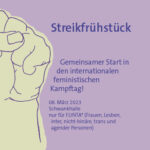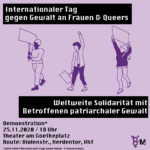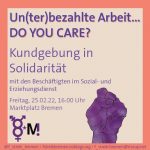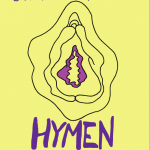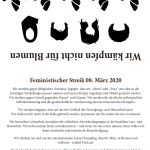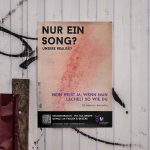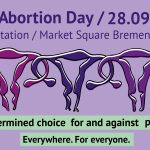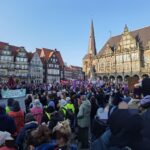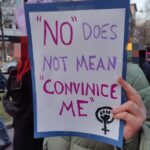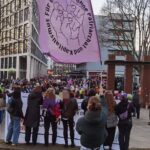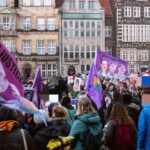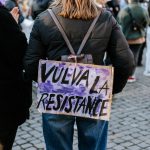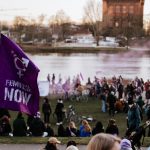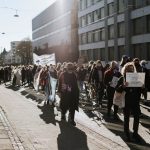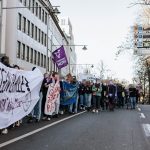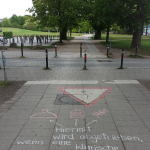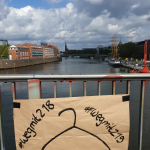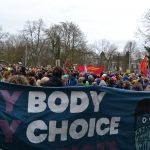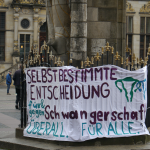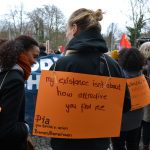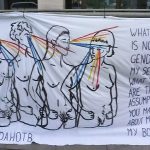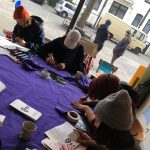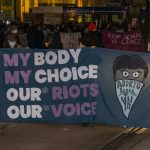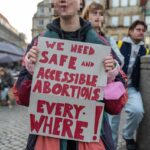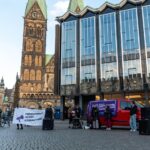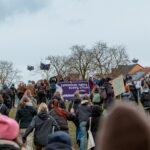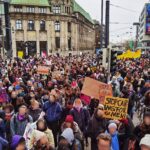(If you don’t know Trans* Recht e.V. yet; we are an association, which offers counselling for people in Bremen and environment who do not indentify or only partially identify with the gender they were assigned at birth. Our consultation hours, contact details and how you can support us with donations can be found via google).
It is unfortunately not self-evident that people have the possibility to have a safe, legal and self-determined abortion. Instead, aspects of reproductive self-determination are repeatedly contested by right-wing and even conservative political currents, with the aim of restricting or not even allowing these rights.
For many of those affected, medical care in the matter of abortion is not as good as it could be, or rather should be. For example, because they live in a country where there are no or hardly any legal possibilities for abortion and/or because the care system discriminates against them.
As I speak here today on behalf of a trans* organization in Germany, I would like to emphasize some aspects that may affect trans* people.
Many cis persons (i.e. people who identify themselves exclusively with the gender assigned at birth) are not aware that some non-binary and male people can become pregnant. This is reveraled by the fact that articles, books, information materials and language usually refer to “the pregnant woman”. Media or individuals who deliberately speak not only of women when it comes to pregnancy or abortion are clearly outnumbered. From a social point of view, the ability to become pregnant is thus exclusively associated with women.
Thereby the fact that there are also non-binary people and men whose bodies have the organs that are biologically necessary for pregnancy is erased.
Accordingly, having an abortion is not an exclusively “female” experience. There are men and non-binary persons for whom access to abortion is as much an issue as it is for cis dya women. However, they are not recognized as persons concerns which leads to barriers and discriminating situations.
Anyone in Germany who needs an abortion that is not performed on the basis of a so-called medical or criminological indication must attend a counseling interview. There are counseling centers of different institutions that offer pregnancy conflict counseling.
Before such a conversation, non-binary people and trans* men ask themselves questions which cis dya women do not have to ask themselves. For example: Are the employees of the counseling center hostile to trans*? Will they take me seriously or will they address me falsely as a woman all the time? Does the counseling center know whether the doctors they refer me to are trans*hostile or trans*friendly?
Many trans* people have bad, abusive experiences in the health care system. For example, because various health issues are simply attributed to their being trans*. Or because they had to experience how doctors refused to treat them or regarded them as “exotic study objects”.
However, the problem of a lack of sensitivity or a lack of acceptance does not begin in the counselling center and ends in the doctor’s office. In order for people to exercise their right to reproductive self-determination, to act responsibly and to make good decisions for themselves, they need to know about their bodies. However, common information materials and websites that provide information about pregnancy, abortion or contraception often do not take trans* people as a target group into consideration. Accordingly, they do not answer any questions that trans* people may ask themselves. For example, whether and how hormone replacement therapy affects fertility.
Constantly being misgendered is extremely uncomfortable for those affected, and equating “being able to get pregnant” with “being a woman” makes it less likely for non-binary people and trans* men to abtain good health care. Even the morning-after pill can cause problems.
The German Federal Chamber of Pharmacists advises pharmacists to only give the medication directly to those affected, so that it can be ensured that the person has received appropriate advice. If people ask for the morning-after pill who do not look like the pharmacist in question expects someone who can get pregnant to look like, this can lead to problems. Because it is very well possible that persons concerned are not trusted when they explain that they need this medicine for themselves.
In order to improve the situation for affected trans* persons, it is necessary for all those involved – counseling centers, pharmacists, doctors – to receive further training and for society to recognize that it is not only women who become pregnant. This will probably be a tough, protracted social process – but we know that those things are difficult and take a long time from other contexts where the reproductive self-determination of marginalized groups is at stake.
Since today is Safe Abortion Day, I have mainly addressed aspects that shed light on access to abortion or contraception for trans* persons affected. However, I would also like to mention that the term reproductive self-determination includes a number of other things that can affect trans* persons. This is because trans* persons and their bodies are not taken into consideration in health care during pregnancy or in modern reproductive medicine, because a cisnormative attitude prevails in all medical fields. Being cis is considered “the normal”, while being trans* is “the other”.
Physical and reproductive self-determination means that individuals must be guaranteed legal and safe access to abortion. Equally, it has to be guaranteed that their physical integrity is protected and that they are not disadvantaged when they carry a child or generally decide to raise children.
Until 2013, trans* persons in Germany had to have themselves sterilized in order to obtain permission to officially change their civil status. This is still the case in many other countries. It is no coincidence that a cisnormative society has produced laws and ways of thinking that attack and violate the reproductive organs and thus the body autonomy of abinary, trans* female and trans* male people This is not just about organs, body parts and their biological functions. It is about which family forms are considered desirable and which should be made impossible. It is about which groups of people are considered valuable and which are devalued because “we don’t want such people here and we don’t want their children here”.
At this point it should become clear that the struggles of different communities are intertwined. Disability, racism, anti-Semitism, classism and trans*misia, for example – in all these forms of devaluation and oppression, one can find ways of thinking such as: “They should not be allowed to have children” or “They can’t decide that. They do not know what is good for them.”
And therefore I will simply repeat the demand of the Women’s and Queer Strike Alliance Bremen: Self-determination and reproductive justice for all!
Now!


